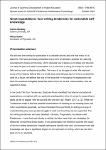Great expectations: our writing tendencies for actionable self-knowledge
| dc.contributor.author | Buckley, C | |
| dc.contributor.author | Syska, A | |
| dc.date.accessioned | 2024-04-24T11:36:11Z | |
| dc.date.available | 2024-04-24T11:36:11Z | |
| dc.identifier.issn | 1759-667X | |
| dc.identifier.issn | 1759-667X | |
| dc.identifier.uri | https://pearl.plymouth.ac.uk/handle/10026.1/22308 | |
| dc.description.abstract |
We all know that writing for publication is a valuable activity and one that many of us aspire to. We have previously presented it as a form of liberatory practice for Learning Development (Syska and Buckley, 2022) showing how it allows us to shape and develop our ideas as part of a wider conversation in LD, and how in doing so it helps to build the field and our own professional profiles. Yet many of us struggle to write. We explored some of the reasons behind this in a small study and although lack of time is consistently cited as a factor, we believe the root of the issue lies in managing the expectations we have for ourselves alongside those that others have for us and, most crucially, how we respond to those. In her book The Four Tendencies, Gretchen Rubin identified that internal and external expectations, enmeshed with our particular predisposition when it comes to responding to tasks, go far to explain ‘why we act and why we don’t act’ (Rubin, 2017, p.12). While her Tendencies relate to the four possible combinations of meeting or not meeting inner and outer expectations generally, we have translated this specifically to writing as a way of understanding why many people struggle to write and how they can be supported. The four writing tendencies we have identified – Strivers, Pragmatists, Actualisers and Freelancers – have their own blocks to writing, but also have their own strategies for effectively overcoming those blocks. In this presentation we therefore outlined the nature of the four writing tendencies, helped participants identify their own, and showed how self-knowledge can have a significant impact on our approach to writing, which we can then pass on to our students. | |
| dc.publisher | Association for Learning Development in Higher Education | |
| dc.subject | 3602 Creative and Professional Writing | |
| dc.subject | 36 Creative Arts and Writing | |
| dc.title | Great expectations: our writing tendencies for actionable self-knowledge | |
| dc.type | Journal Article | |
| plymouth.issue | 29 | |
| plymouth.publication-status | Published online | |
| plymouth.journal | Journal of Learning Development in Higher Education | |
| dc.identifier.doi | 10.47408/jldhe.vi29.1129 | |
| plymouth.organisational-group | |Plymouth | |
| plymouth.organisational-group | |Plymouth|REF 2021 Researchers by UoA | |
| plymouth.organisational-group | |Plymouth|Users by role | |
| plymouth.organisational-group | |Plymouth|Users by role|Current Academic staff | |
| plymouth.organisational-group | |Plymouth|PS - Library and Academic Development | |
| plymouth.organisational-group | |Plymouth|REF 2021 Researchers by UoA|UoA23 Education | |
| plymouth.organisational-group | |Plymouth|REF 2029 Researchers by UoA | |
| plymouth.organisational-group | |Plymouth|REF 2029 Researchers by UoA|UoA23 Education | |
| plymouth.organisational-group | |Plymouth|Users by role|Current Associate Lecturers | |
| dc.date.updated | 2024-04-24T11:36:10Z | |
| dc.rights.embargodate | 2024-04-27 | |
| dc.identifier.eissn | 1759-667X | |
| rioxxterms.versionofrecord | 10.47408/jldhe.vi29.1129 |


